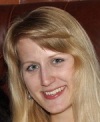 Psychology/Multicultural Education/Awareness
Psychology/Multicultural Education/Awareness
Paulina Miecznikowska has witnessed countless small miracles as human beings connected with each other across chasms of social and cultural differences. Since 2000, Paulina has been associated with the Słupsk Community Centre (SOK), whose goal is one of empowerment through identity, dialogue, cultural understanding, and artistic expression. SOK provides displays, cultural days, and a variety of activities that include theatre, photography, movies, music, batik, and pottery. The award-winning youth theatre group is “Gwizdże,” performing in the Rondo Theatre.
Because of the effectiveness of these experiences, Paulina is interested in “the social and cultural aspects of life, not the political” as a means of peace-building. She hopes to bring young children together in learning-by-fun activities. “I believe in integrating people at an early stage of life when their emotional and ethical systems are being developed.” Growing up together reduces the impact of discrimination, and can foster love and daily cooperation if differences are respected and commonalities are stressed, “adding important pieces to a future long-lasting dialog.”
Paulina is a fourth year student, specializing in Cross-Cultural Psychology and Gender Psychology. “Psychology is not only a counseling therapy as some may think. It’s a whole array of skills necessary to life, like listening, understanding, observing, speaking your mind, cooperating with people, even leadership and entrepreneurial abilities.” She believes this specialization will provide the psychological tools to overcome the intolerance that can lead to aggression.
As a member of the Psychology Student Association, Paulina is involved in workshops, exchanges with other universities, organizing professional conferences, lectures, and projects such as the Children’s University for Europe at the University of Gdańsk, which conducts weekend classes and art workshops centering on cultural diversity for primary school levels. She also helps with the annual international conference on “Woman in Culture” which aims to raise awareness of women’s position in the cross-cultural perspective.
A basis of mutual understanding among a global network of young leaders and entrepreneurs will make cultural, governmental, and financial exchanges more effective in the future. “Being able to use the passion and potential of young people is a key to success.” Programs such as HSI fit well with her vision.
While living in Israel for three months in an exchange program, Pauline realized how vital multicultural understanding is during the explosive Operation Pillar of Defense in Gaza, where tensions could easily have escalated. She felt that the ability to empathize was critical to maintaining peace.
In Poland, she had participated in a “Living Bridge, Poland—Israel” project, consisting of cultural awareness workshops, simple peer talks, social activities, sightseeing, and spending time together. In 2012, its leadership fell to her. She co-conducted a group of Polish, Jewish, Arabic, and Druze young people, a highly mixed group meeting for the first time in Gdańsk where they learned to cooperate and set goals daily. The seminars concerned culture, history, stereotypes, prejudices, and the psychology of conflict. Paulina’s responsibilities included recruitment, documentation, scheduling, a language workshop, guiding participants through the whole program, and evaluating responses. “We spent every evening together talking and laughing, making friends and creating bonds.” She believes she made a difference in individuals opening up and cooperating, contributing to “a living bridge—the mutually enriching relationship between young leaders.”
Paulina is interested in a worldwide impact. “We cannot take it for granted that one style of leadership is successful in every country,” she says. Employing her negotiation and mediation skills, Paulina would like to become a cross-cultural psychologist/awareness coach, working with businesses, media, local communities, and youth centers, focusing on “how to be a part of multicultural society in a globalized world.”

